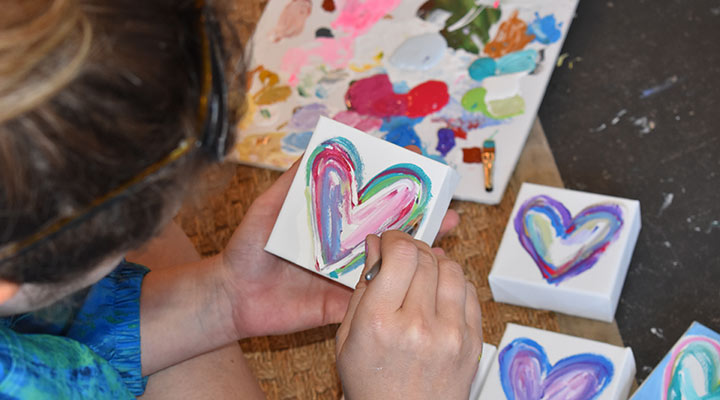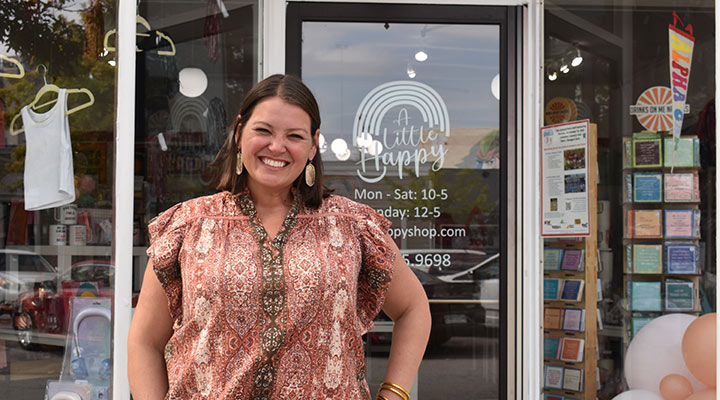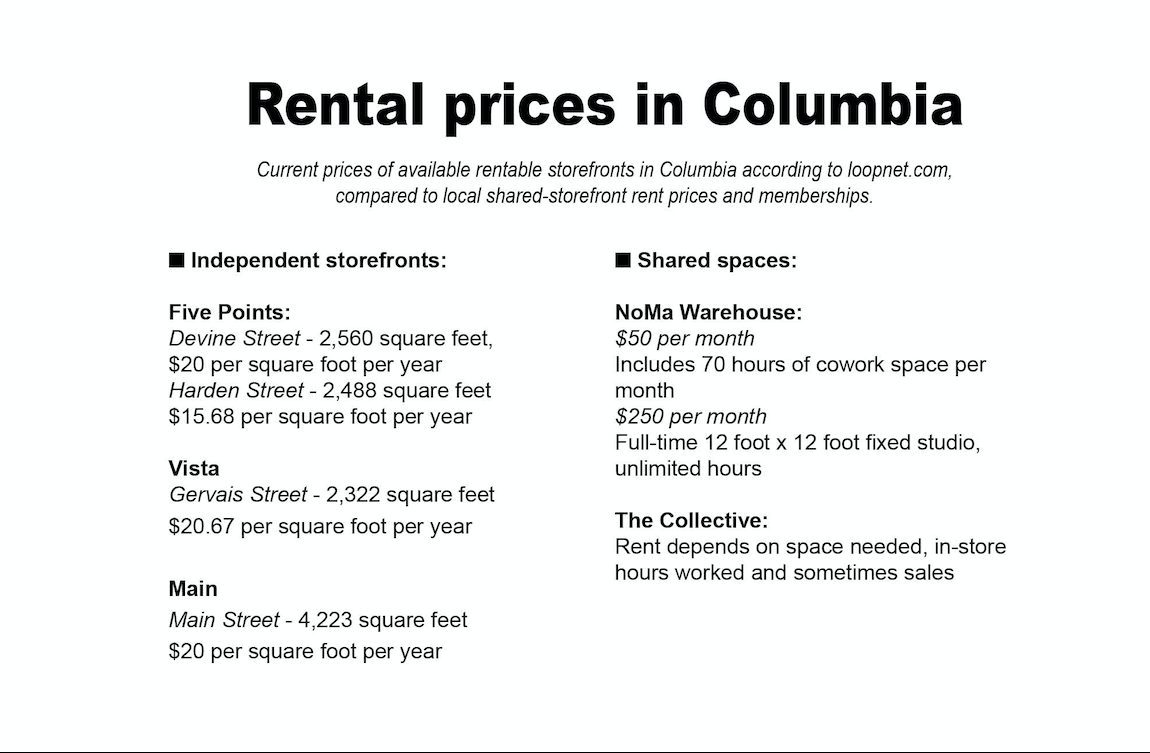Small business owner Leah Richardson paints a heart on a canvas for her display at The Collective. (Photos and graphic by Audrey Elsberry)
In the entrance of The Collective, okra pods are splayed out across the floor drying as Leah Richardson paints each individual pod into a tiny Santa Claus.
“These are my ho-ho-hokra!” Richardson said as she painted.
The little vegetables are some of her most popular items during the holiday season, she said.
Richardson is the owner and artist behind Dream A Little Art, a business she started after the birth of her daughter in 2016. She uses The Collective, a small business boutique, as both a studio and a place to sell her art. The boutique is nestled between the downtown Columbia neighborhoods of Heathwood and Melrose Heights.
Many small businesses across Columbia choose to operate through shared spaces similar to The Collective and NoMa Warehouse, as opposed to opening their own storefronts. Some use these shared spaces as a launchpad to build a business before opening their own space, while others are content to stay in the shared environment.
The Collective is a retail store that charges rent to people who wish to sell their products there. A rented space can be as small as a single shelf or as large as a quarter of the store.
Rebekah Thomas and Julia Strasburger took over The Collective from its original owner, Ashley Williams, last year. The two also own an embroidery business within The Collective called Petal and Fern.
The two women transformed the original concept of the store — a workspace for a handful of businesses with limited hours — into a group of more than 20 businesses selling their products and functioning like a boutique, open five days a week.
As Richardson sits on the floor painting okra, paintings of Columbia landmarks color the walls above her.
“Obviously working with color is my favorite,” Richardson said, gesturing towards her display. “But I do commission work, nursery art, abstracts. Marshes are kind of my favorite thing — landscape-type art. I really enjoy painting those.”
“But I’m getting ready for the holiday season now,” she said, eyeing the ho-ho-hokra.
Each small business in The Collective has its own social media following and attracts its own customer base — one shop’s customer could come in and end up buying from several of the businesses. The collaborative nature of the space takes the pressure off of each individual business for getting people in the door, and allows them to share the wealth, Richardson said.
“This is what makes this so unique and brilliant in my opinion,” Richardson said.
Shirley Durant is also at The Collective, selling her watercolor paintings. She started an Etsy page — an online-only homemade craft shop, SHIRLDArt.
“I had even been thinking, oh, we need to be able to be in a store, but you know, that was just like this huge thing I couldn’t see doing on my own,” Durant said.
When owners Thomas and Strasburger approached Durant about joining The Collective, it seemed to be the perfect fit, Durant said.
Access to capital is the main reason independent businesses struggle to open their own brick-and-mortar stores, said Ayesha Driggers, interim director of Columbia’s Office of Business Opportunities.
A 2,322-square-foot storefront now for rent in the Vista on Gervais Street costs $3,870 per month, according to a listing on loopnet.com. A Five Points listing with 2,488 square feet runs $3,251 per month.
In contrast, Durant pays $300 a month to The Collective for a four ft wide table with wall space behind the table, and a couple of shelves to display her art.
The Collective charges rent on a case-by-case basis.
“As vendors, they come in, they decide how much space they would like to take up, what they want their display to look like, and they pay for that space accordingly,” Thomas said. “And then we all work together to share the shop hours.”
Working together means attending the single check-out counter for the store or maintaining a presence so the doors remain open.
“Some of the vendors, for example, might work more hours to decrease their rent,” Thomas said. “Other ones have a smaller space or a bigger space or they let us move their space around as needed.”
A few businesses have outgrown The Collective’s space and opened their own shops. Ashley Lindler is one of those.
Lindler started A Little Happy in 2020 — just before the pandemic shutdown — with only two shelves and a table at The Collective. Her small, gift-shop-style business eventually grew to 25% of the shop, she said. In 2021, she signed a lease for her own store on Saluda Avenue in the heart of Five Points.
Two years later, she still is not in the storefront she rented — the owner is still renovating it. Instead, she is two doors down in what used to be a gallery for Tapp’s Outpost.
Nevertheless, Lindler said she is happy to be in her own space and says business has never been better.
At The Collective, “there were some days where, you know, we might see five customers, whereas here, I’m sure we see 100 people a day.”
Lindler said she opened her storefront on Black Friday of 2021. That December, she made the same revenue she made the previous 11 months at The Collective.
She reports sales now are 10 times what they were at The Collective.
Lindler pays $1,600 per month in her temporary space, and expects to pay $2,000 when her permanent space is ready. She said she paid $150 in rent in her final month at The Collective.
Despite her love of her new space, Lindler enjoyed The Collective’s community, she said, especially the advice she got from other business owners about how to purchase wholesale products for her store.
While Lindler successfully opened her own store, others have no interest in their own shops.
Jessica Ream, a mixed-media artist, has a space to sell her art in The Collective. She also works out of NoMa Warehouse, which she uses more as a studio than a storefront.
NoMa Warehouse is a co-working space in the Cottontown neighborhood off North Main Street in downtown. NoMa also has weekly flea markets where those renting a space can sell their products.
Rent at NoMa Warehouse can range from $50 to $250, depending on what membership you buy.
“I’ve never wanted to have my own store or gallery or anything,” Ream said.
Nicolette Bryan also favors communal spaces.
Bryan and business partner John O’Connell are co-owners of A Peddler’s Emporium, which sells tufted rugs, terrariums and other items. Bryan said she enjoyed being at NoMa because all she needed was a product to sell and a retail license to sell it.
NoMa has to “deal with all the insurance and everything, so I think that’s another big thing of opening a brick-and-mortar is having to deal with the insurance of it all,” Bryan said.
Bryan and Ream both said being an artist can be lonely, and working in an environment surrounded by other artists improves the experience. They both said they enjoyed getting feedback from other members of the shared space and seeing all the businesses succeed.
Bryan left NoMa Warehouse recently and plans on opening a shared storefront with other creatives next year.
Back at The Collective, Richardson is content.
“Because we’re all, you know, a lot of ‘mamas,’” she said. “Whether it’s, you know, young mamas, middle-aged mamas. We’re all just kind of doing stuff on the side.”
She also likes seeing trends and business models around her evolve.
“I love change,” she said. “Some people don’t like change. I think change is fun. It’s like growth.”
Artist Leah Richardson’s “ho-ho-hokra” are dried and painted okra pods. The festive vegetables are her most popular item during the holiday season.
The owner of A Little Happy, a small business on Saluda Avenue, said having her own storefront has made all the difference in the success of her business.





